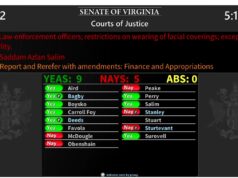From the VA House Democratic Caucus:
Virginia House Democrats Applaud Their Landmark Legislation Becoming Law
RICHMOND—House Democrats celebrated as Virginia Governor Ralph Northam signed many of their top legislative priorities into law before his midnight deadline on Saturday, April 11. The signed legislation included crucial gun violence prevention measures, numerous expansions of voting rights, important environmental protections, much-needed repeal of restrictions on women’s ability to make their own reproductive healthcare decisions, essential civil rights safeguards for the LGBTQ+ community, and long-overdue repeal of racially discriminatory language from the Commonwealth’s Acts of Assembly.
The Governor’s deadline to sign, veto, or amend legislation passed during the 2020 General Assembly session was Saturday, April 11 at 11:59 PM. The General Assembly will address the Governor’s amendments and veto during the upcoming Reconvened Session.
“With the Governor’s actions, so much of the incredible progress achieved by the House of Delegates during the 2020 session is now law,” said Speaker of the House Eileen Filler-Corn. “We have made our Commonwealth safer, our democracy stronger and delivered on our promise of a fairer, more equal Virginia. We have improved the lives of Virginians in every corner of the Commonwealth by expanding access to quality healthcare, transforming our transportation system, combating climate change and so much more. By following through on the mandate voters gave us in November, we have passed laws that will benefit generations of Virginia.”
“Just last year, much of this agenda was not possible,” said Democratic House Majority Leader Charniele Herring. “The progress we made during this legislative session is thanks to the 2.9 million voters in Virginia who entrusted us to move the Commonwealth forward. We listened to the voters and delivered on the changes they requested”
Campaigning on these issues in 2019 helped the Democrats to win the House of Delegates for the first time in more than 20 years. This historic win — coupled with the fact that Senate Democrats had also regained the majority — enabled the House Democratic Caucus to pass this crucial legislation during the landmark 2020 legislative session.
“Our laws now more than ever represent a modern Commonwealth and the change voters demanded on issues ranging from gun safety to renewable energy,” said House Democratic Caucus Chairman Rip Sullivan. “House Democrats worked together to pass legislation that will meaningfully improve the lives of Virginians everywhere across the Commonwealth. I am proud of what we were able to achieve during this historic session.”
The House under Democratic leadership passed 828 pieces of legislation, prior to the crossover legislation deadline, which was 37 percent more than the House of Delegates passed by the same time in 2019. In comparison to this year’s 828 bills, the House passed 603 bills in 2019, 591 bills in 2018, 586 bills in 2017, and 583 bills in 2016 — all while the Republican party held control of the chamber.
Summaries of the House Caucus milestones signed into law:
- Strengthened gun violence prevention. Five House bills establishing stronger gun safety measures — all introduced in response to the Virginia Beach tragedy in May 2019 — were signed by the Governor. These laws implement universal background checks for sales of firearms, requirements to report lost and stolen firearms, preventing child access to firearms, establishing substantial risk protective orders, and restoring a limit on the number of gun purchases a person may make per month.
- Protected the environment through the Virginia Clean Economy Act which puts Virginia on the path toward a 100 percent renewable energy supply by 2050.
- Widened discrimination protections for the LGBTQ+ community by creating new safeguards and protections, mandating that state employees undergo cultural competency training, and broadening the definition of a hate crime. The Commonwealth will now outlaw discrimination in employment, public accommodation, public contracting, apprenticeship programs, housing, banking, and insurance due to sexual orientation or gender identity.
- Expanded voting rights with measures to grant people more accessibility and flexibility to vote. These laws include making election day a state holiday instead of Lee-Jackson Day, implementing “no excuse” absentee voting, and ensuring that mail-in ballots postmarked on election day can be counted.
- Restored reproductive rights by rolling back some of the most harmful restrictions on abortion access in Virginia such as forcing women to undergo medically-unnecessary ultrasounds, waiting periods for abortion services, and biased counseling. The law also repeals medically-unnecessary restrictions on medical personnel and facilities, so that qualified advanced practice clinicians may perform abortions during early pregnancy, provided that it falls within the scope of practice. Abortion care providers may offer services to patients without the interference of targeted regulations imposed to limit such services.
- Repealed racially discriminatory Acts of Assembly. The injustices in these old laws included de jure school segregation and housing discrimination, as well as restrictions on African Americans relating to public transportation, medical care, public documents, and public facilities.
Summaries of the House Democrat’s milestone legislation that received amendments from the Governor, which will be before the House at the reconvened session:
- Allowing localities the authority to regulate the possession, carrying, storage or transport of firearms, ammunition, components, or any combination of those things in public spaces and during events requiring a permit.
- Prohibiting people subject to protective orders from possessing firearms. Virginia currently does not prevent persons convicted of misdemeanor domestic-violence offenses from purchasing or possessing firearms.
- Raising the minimum wage to help working families and the most financially vulnerable Virginians. The House and Senate agreed to raise the minimum wage over the next three years to reach $12 in 2023, putting it on the pathway to a $15 minimum wage.
- Establishing access to collective bargaining for public employees, including teachers and firefighters, in localities which choose to participate.
- Removing the criminal penalty for simple marijuana possession, and establishing a civil fine of $25.
- Tackling climate change by authorizing the Commonwealth to join the Regional Greenhouse Gas Initiative (RGGI).



![CNU Wason Center Poll of Virginia: Trump Approval at Just 34%; “narrow majority support a constitutional [redistricting] amendment”](https://bluevirginia.us/wp-content/uploads/2026/01/wason0128-1-238x178.jpg)







